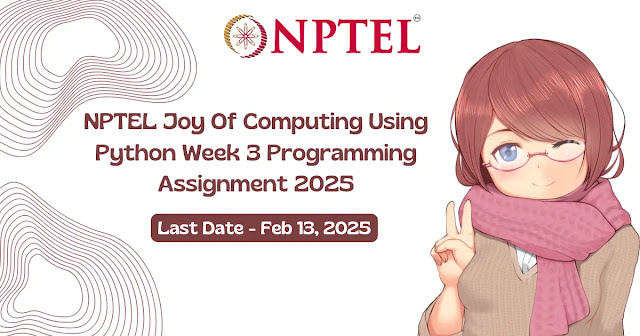This article provided the solutions for NPTEL Joy Of Computing Using Python Week 3 Programming Assignment 2025. These programs passed all test cases. So, Come with us to know more about answers. If you didn't complete the week 3 quiz answers, the link is provided below.
Also Read: NPTEL Joy Of Computing Using Python Week 3 Quiz Answer
NPTEL Joy Of Computing Using Python Week 3 Programming Assignment 2025
Last Date: 13-02-2025
Q1. Create a Python program that finds the second smallest number in a list of positive integers (including zero). The program should prompt the user to input a list of numbers, then compute and print the second smallest number in that list.
Input Format:
- The input consists of a single list of numbers, separated by spaces.
- Hint: Use .split() function to convert input to list.
Output Format:
- The output consists of the second smallest number in the input list.
Example:
Input: 3 1 4 1 5 9 2 6 5 3 5
Output: 2
Program Code:
def find_second_smallest(numbers):unique_numbers = list(set(numbers))if len(unique_numbers) < 2:return "No second smallest number available"unique_numbers.sort()return unique_numbers[1]numbers = list(map(int, input().split()))print(find_second_smallest(numbers),end="") {codeBox}
Q2. Create a Python program that removes even duplicate positive integer numbers(includes zero) from a list and prints the unique numbers in the order they first appeared.
The program should prompt the user to input a list of numbers, then process the list to remove duplicates and print the resulting list of unique numbers.
Input Format:
The input consists of a single list of numbers, separated by spaces.
Output Format:
The output consists of the unique numbers, separated by spaces, from the input list, in the order they first appeared.
Example:
Input:
3 1 4 1 5 9 2 6 5 3 5
Output:
3 1 4 1 5 9 2 6 5 3 5
Program Code:
def remove_even_duplicates(numbers):seen = set()unique_numbers = []for num in numbers:if num % 2 != 0 or num not in seen:unique_numbers.append(num)seen.add(num)return unique_numbersnumbers = list(map(int, input().split()))print(" ".join(map(str, remove_even_duplicates(numbers))),end="") {codeBox}
Q3. Create a Python program that takes a list of integers, reverses the list, adds the values at even indices from both the original and reversed lists, and creates a new list with the result. The new list should be printed in the end.
Input Format:
The input consists of a single list of integers, separated by spaces.
Output Format:
The output consists of the new list of values, separated by spaces, obtained by adding values at even indices from both the original and reversed lists.
Example:
Input:
1 2 3 4 5
Output:
6 2 6 4 6
Program Code:
def process_list(nums):reversed_nums = nums[::-1]result = []for i in range(len(nums)):if i % 2 == 0: # Only consider even indicesresult.append(nums[i] + reversed_nums[i])else:result.append(nums[i])return resultnums = list(map(int, input().split()))result = process_list(nums)print(" ".join(map(str, result)), end="") {codeBox}
Conclusion
For any more Updates or Further Upcoming Assignments, Join the Telegram provided below.


This content really helped me boost my knowledge in the domain. I was planning to work in this field but wasn’t getting interview calls. After getting my resume redesigned from crazeneurons.com
ReplyDeletefor ₹599, I started receiving calls within 2 weeks.
Check real feedback: https://crazeneurons.com/
Contact on WhatsApp: https://wa.me/918368195998?text=I%20want%20an%20ATS-Friendly%20Resume